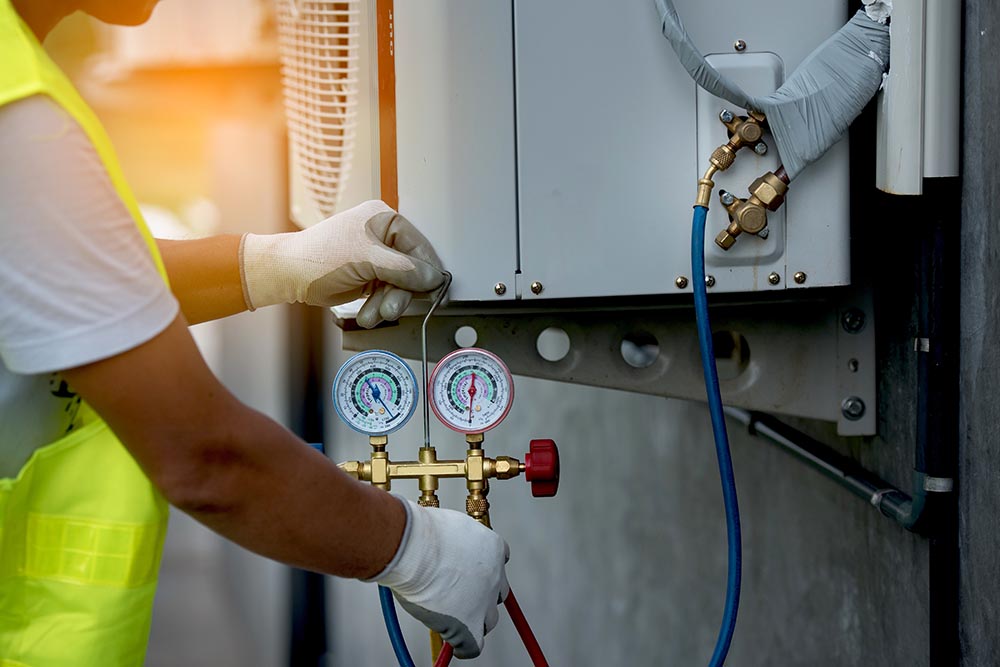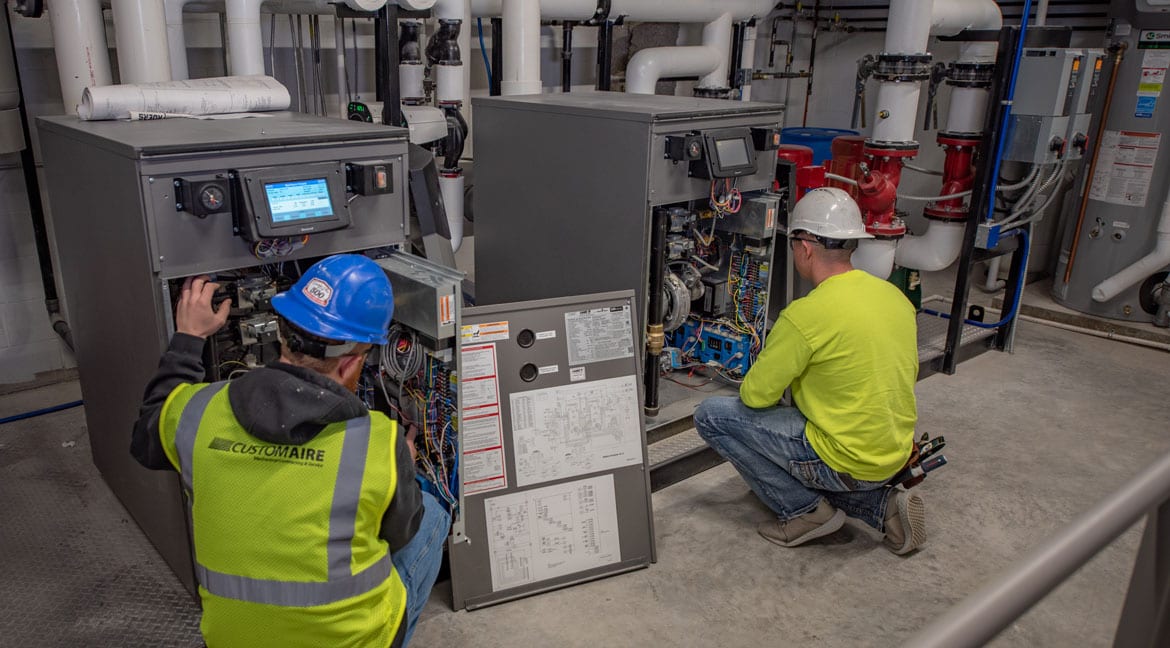Detailed Process Breakdown for heat pump installation ooltewah tn
Detailed Process Breakdown for heat pump installation ooltewah tn
Blog Article
Choosing Between a Warm Pump and Heater: Key Considerations for Your Cooling And Heating Needs
When assessing heating options for cooling and heating requires, the decision between a heatpump and a heater can be complicated. Each system supplies unique advantages tailored to specific climates and energy effectiveness objectives. Comprehending these distinctions is crucial for making an enlightened choice. Trick elements such as installment costs and environmental impact further complicate the choice process. Which choice absolutely aligns with one's comfort and sustainability preferences? The complying with areas will certainly explore these considerations carefully.
Recognizing Warmth Pumps: Exactly How They Function and Their Advantages
While many homeowners consider various heating options, recognizing exactly how heat pumps feature and their advantages can greatly affect their choice. Heatpump operate by moving warmth instead of producing it. In the winter months, they extract warmth from the outside air or ground and move it inside, while in the summertime, they reverse this procedure, cooling down the home by removing warm outside. This twin functionality makes them functional for year-round environment control.One of the key advantages of heatpump is their energy efficiency. They use considerably less electrical energy compared to conventional heater, potentially resulting in reduced utility costs (heat pump service). Additionally, heatpump have a smaller sized carbon footprint, making them an eco pleasant choice. They additionally call for less upkeep than traditional systems, adding to long-term expense savings. On the whole, recognizing the technicians and benefits of heatpump can help home owners make informed choices regarding their heating and cooling needs
Discovering Heaters: Types, Operation, and Benefits
Heaters come in various types, including gas, electrical, and oil models, each with unique functional mechanisms. Comprehending these distinctions is crucial, as they impact effectiveness and heating efficiency. Additionally, heaters provide numerous benefits, such as constant heat outcome and dependability in colder climates.
Kinds of Heaters
Heating unit can vary significantly in layout and operation, with heating systems being a prominent choice among homeowners. There are numerous kinds of heaters, each using various fuel sources and innovations. Gas furnaces prevail, leveraging all-natural gas to produce warm successfully. Electric furnaces, on the various other hand, use electric resistance to generate heat, frequently preferred for their straightforward installation. Oil heating systems, while less usual, work in locations with restricted gas access (heat pump service). In addition, condensing heaters make best use of energy performance by capturing and recycling exhaust gases. Each kind operates via a system of heat exchangers and ductwork to distribute cozy air throughout a home. Comprehending the distinctions in between these furnace kinds is important for educated cooling and heating decisions
Advantages of Furnaces
For homeowners looking for reputable heat during cool months, the benefits of furnaces are significant. Heating systems provide constant heating, making sure also temperature levels throughout the home. They are specifically reliable in extreme cool, usually outmatching heat pumps in freezing problems. Numerous types, including gas, electrical, and oil heaters, provide versatility to satisfy diverse requirements and preferences.Furnaces also often tend to have lower first installment costs compared to heatpump, making them a more available option for many. Their robust style contributes to a much longer life-span, with several units lasting over 15 years with appropriate maintenance. Additionally, modern heaters are often furnished with innovative innovation for enhanced performance, which can lead to lowered power costs. Generally, heating systems remain a dependable option for effective home heating.

Energy Performance: Comparing Warmth Pumps and Furnaces
When comparing power efficiency in between heat pumps and heaters, the Seasonal Energy Performance Ratio (SEER) plays an essential role in figuring out performance. Furthermore, a functional price analysis exposes the lasting economic implications of each system. Comprehending these aspects can lead property owners in making notified choices about their heating services.
Seasonal Energy Efficiency Proportion
Power efficiency plays a necessary function in the decision-making process in between warm pumps and furnaces, especially when considering the Seasonal Power Efficiency Proportion (SEER) This statistics steps the cooling efficiency of warm pumps over an entire air conditioning period, giving a standardized method to evaluate efficiency. Higher SEER scores suggest better energy efficiency, equating to reduced power consumption and decreased energy bills. On the other hand, heaters are generally examined utilizing the Annual Fuel Utilization Efficiency (AFUE) score, which shows heating efficiency. When contrasting these two systems, homeowners must prioritize SEER rankings for heatpump, as they directly effect overall energy financial savings and ecological sustainability. A detailed understanding of SEER can significantly affect the long-term contentment and cost-effectiveness of the selected cooling and heating solution.
Functional Expense Evaluation
Recognizing the operational expenses related to warmth pumps and heaters is essential for home owners evaluating their alternatives. Heatpump typically supply higher power performance, converting electrical energy into warm with marginal waste. This results in reduced regular monthly energy costs, specifically in modest environments. On the other hand, standard heaters, especially gas models, might have lower ahead of time expenses yet can sustain higher functional expenses with time as a result of sustain prices and performance ratings.Moreover, heat pumps can function as both home heating and cooling systems, possibly minimizing the demand for separate cooling and heating systems. While initial investments for heatpump may be greater, their long-term financial savings in energy effectiveness can make them a more try this website affordable choice for numerous families. Mindful evaluation of local energy rates is vital to identify the most effective alternative.
Installment Prices: What to Anticipate for Each Furnace
Installation prices for heating systems can vary considerably in between warm pumps and heating systems, influencing property owners' choices. Heatpump generally have higher ahead of time installation prices, normally ranging from $3,500 to $8,000, depending upon the system size and complexity of installation. This includes the outdoor unit, indoor handling system, and necessary ductwork alterations. Conversely, furnaces often tend to have reduced first costs, balancing in between $2,500 and $6,000, which can be appealing for budget-conscious homeowners. Nevertheless, installation costs can increase if extensive ductwork is required.Moreover, the choice of fuel kind for heaters-- all-natural gas, lp, or electric-- can also influence installment expenses. While heatpump provide power effectiveness, their initial financial investment may prevent some purchasers. Inevitably, reviewing setup costs together with long-term financial savings and efficiency will certainly assist homeowners in making notified decisions regarding their heating unit.
Environment Considerations: Which System Does Better in Your Location
How do climate problems influence the efficiency of heating unit? The performance of warmth pumps and furnaces can differ greatly depending upon the local climate. In moderate environments, heatpump stand out by efficiently transferring warm from the outdoors air, making them an energy-saving option. Their effectiveness diminishes in very cool temperature levels, where they may have a hard time to extract adequate warmth. Conversely, heating systems, specifically gas versions, provide constant and dependable heat regardless of outside conditions, making them more effective in colder regions.In locations that experience milder winters months, warmth pumps can run effectively year-round, supplying both home heating and air conditioning. On the other hand, areas with rough winters typically profit from the effectiveness of furnaces. Inevitably, recognizing the neighborhood environment is crucial when deciding in between a warmth pump and a heating system, as it straight impacts their operational effectiveness and total performance.
Maintenance Demands: Long-Term Take Care Of Warm Pumps vs. Furnaces
While both warmth pumps and heaters call for routine maintenance to assure peak efficiency, their certain needs and care routines vary considerably. Heaters commonly need much less regular focus, with annual inspections sufficing to look for gas leakages, tidy filters, and examine general capability. Their easier layout typically allows for simple repairs.In contrast, heatpump necessitate semiannual upkeep due to their double role in cooling and heating. This consists of cleaning coils, checking cooling agent degrees, and guaranteeing that both the interior and outside devices work at their finest. Furthermore, heatpump upkeep often involves more elaborate parts, making specialist servicing essential.Neglecting maintenance can lead to reduced efficiency and raised power prices for both systems. Eventually, home owners must think about these long-term treatment needs when picking between a heatpump and a furnace, as positive maintenance can expand the lifespan and efficiency of either system substantially.
Environmental Impact: Choosing a Sustainable Home Heating Choice
The environmental influence of heating unit is a critical examination for house owners looking for sustainable choices. Warmth pumps are usually more energy-efficient than conventional furnaces, as they transfer heat rather than produce it, significantly minimizing carbon exhausts. By using renewable resource resources, such as air-source or geothermal heatpump, homeowners can better lessen their eco-friendly footprint.On the other hand, natural gas heating systems give off greenhouse look at this now gases and contribute to air contamination, though they often supply greater heat outcome. However, improvements in innovation have caused the development of high-efficiency heating systems that decrease emissions.Ultimately, choosing a heater involves weighing performance against environmental effect. House owners are urged to review local power sources and rewards for eco-friendly systems, guaranteeing a choice that aligns with both individual convenience and ecological responsibility. The decision impacts not only prompt convenience yet additionally long-lasting sustainability and environmental health.
Often Asked Inquiries
For How Long Do Warmth Pumps and Furnaces Typically Last?
The lifespan of warm pumps typically varies from 15 to two decades, while heaters can last in between 15 to three decades. Normal upkeep significantly influences their long life and efficiency in giving home heating remedies.
Can I Use a Heatpump in Extremely Cold Climates?
Heat pumps can run in very cool climates, but their efficiency decreases as temperatures decrease. In such problems, additional heating sources might be click over here necessary to preserve comfortable interior temperature levels and assure peak efficiency.

What Is the Sound Degree of Warmth Pumps Versus Furnaces?
The noise levels of heatpump and heaters differ significantly. Typically, heatpump run even more quietly than traditional heating systems, making them more suitable for those sensitive to appear, while furnaces may generate louder functional noises during heating cycles.
Are Warm Pumps Suitable for Both Cooling And Heating?
Warm pumps are without a doubt appropriate for both cooling and heating (heat pump installation ooltewah tn). They function by transferring warmth, offering reliable temperature control year-round, making them a flexible option for homeowners looking for an all-in-one cooling and heating option
What Size Heater Do I Required for My Home?
Identifying the proper size home heating system for a home needs reviewing factors such as square footage, insulation high quality, local environment, and the home's design. Consulting an expert can guarantee a precise assessment and suitable comfort. Warmth pumps commonly provide greater energy performance, converting electrical power into heat with minimal waste. In moderate environments, warm pumps stand out by effectively moving warm from the outdoors air, making them an energy-saving choice. Alternatively, heating systems, specifically gas designs, offer consistent and trusted heat no matter of outdoor conditions, making them more effective in cooler regions.In locations that experience milder winters, heat pumps can run efficiently year-round, supplying both home heating and air conditioning. Warmth pumps are typically a lot more energy-efficient than conventional heating systems, as they move warm rather than generate it, greatly minimizing carbon discharges. By utilizing eco-friendly power sources, such as geothermal or air-source heat pumps, homeowners can even more minimize their environmental footprint.On the other hand, all-natural gas furnaces emit greenhouse gases and contribute to air pollution, though they typically offer greater warmth outcome.
Report this page